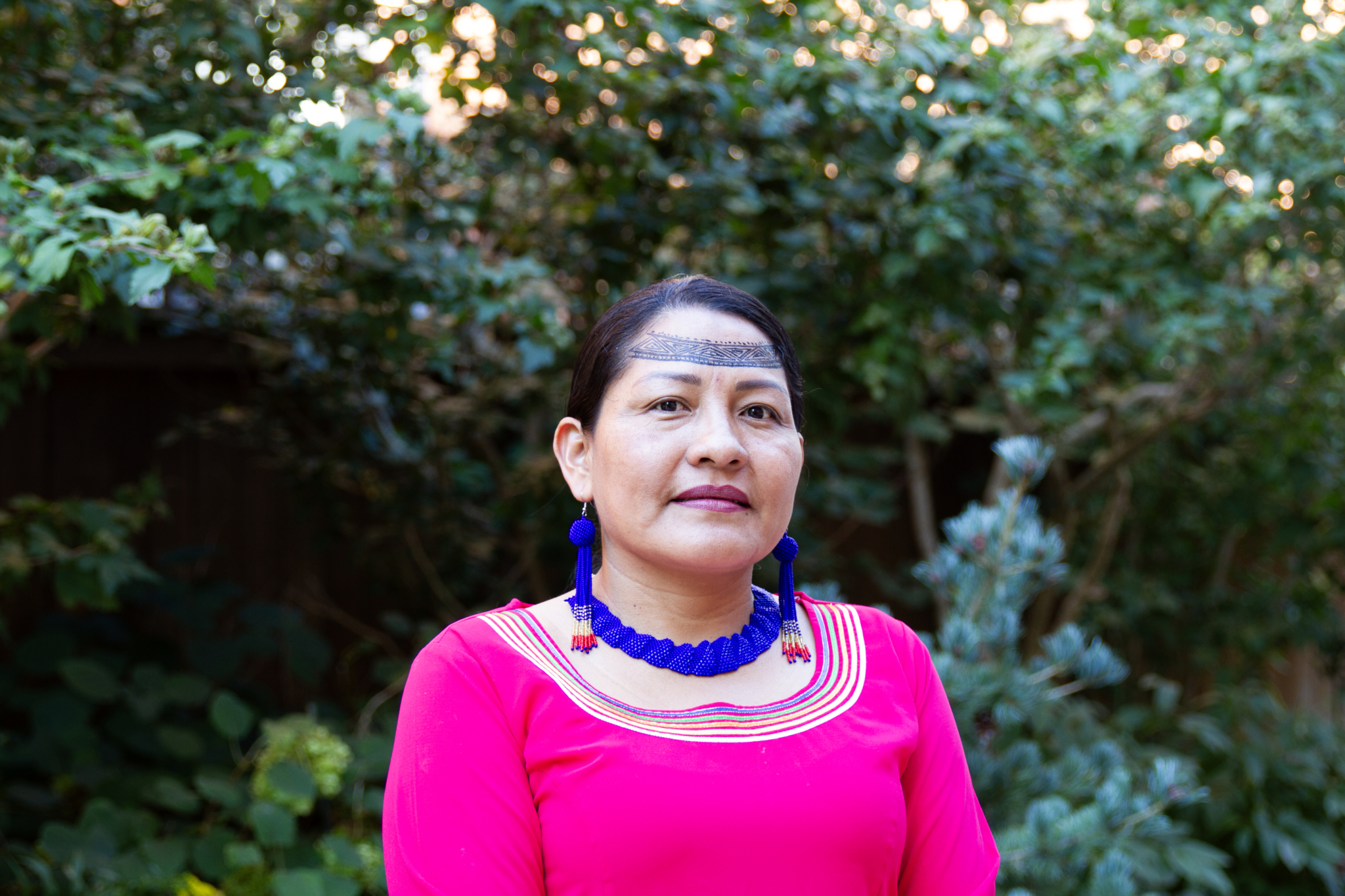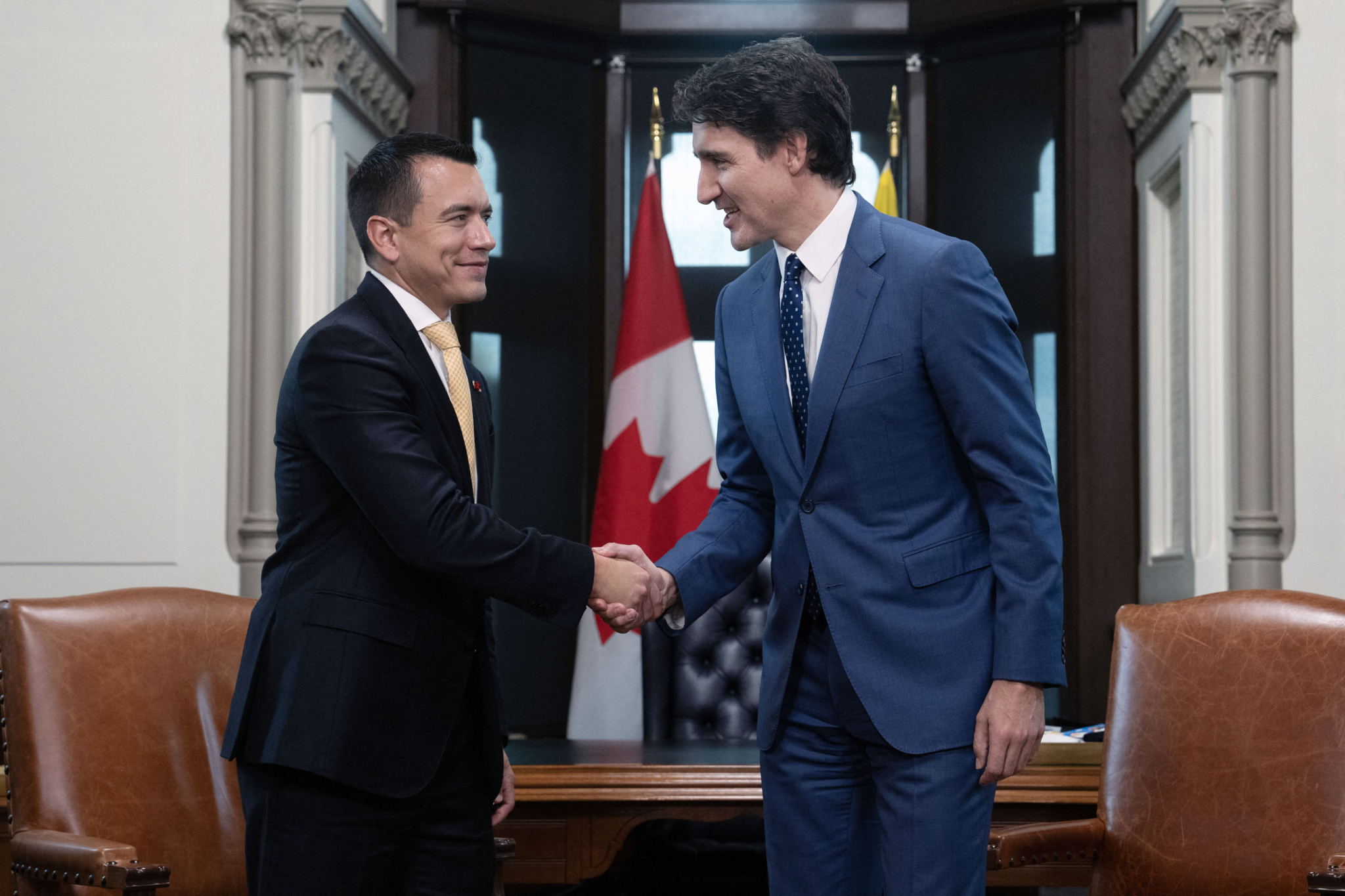The proposed Canada-Ecuador Free Trade Agreement represents a dire threat to Indigenous rights in Ecuador and must be rejected by Canadian lawmakers, a coalition of Canadian civil society organizations said today, amplifying the concerns of Indigenous and women’s rights defenders in Ecuador.
This week, government leaders in Canada and Ecuador announced the finalization of a controversial trade deal that, if ratified, will harm the rights and ways of life of Indigenous Nations on the front lines of climate change. Touted by Ecuadorian President Daniel Noboa on the eve of national elections in his country, the Canada-Ecuador Free Trade Agreement is moving forward amid opposition by Ecuador’s largest Indigenous organization and several Indigenous Nations already facing human rights abuses in connection with Canadian mining projects on their territories.
- Related: “This is Why We Say No!” Ecuadorian Indigenous Women and Rights Defenders Speak Out About Canada-Ecuador Free Trade Negotiations
- Take action: No Ecuador trade deal without human rights and consent
Of particular concern, the proposed agreement features an investor-state dispute settlement (ISDS) mechanism despite Ecuadorians having voted in a 2024 constitutional referendum to ban the inclusion of ISDS in future trade deals. Multiple UN bodies and experts have recommended that ISDS not be included in new trade agreements and that they be removed from existing ones, warning that ISDS shackles states in their efforts to combat climate change and to live up to their international human rights obligations.
Canada-Ecuador Free Trade Agreement ‘favours’ mining companies, President Noboa: Indigenous leader
“The Free Trade Agreement between Ecuador and Canada only favours transnational mining companies and the private interests of the family of President Daniel Noboa,” said Zenaida Yasacama, acting-president of the Confederation of Indigenous Nationalities of Ecuador (CONAIE), Ecuador’s largest Indigenous organization.“Canadian mining operates without respecting the rights of communities, promoting dispossession, water pollution and the criminalization of those who defend life and territory. The Indigenous Peoples and Nations will not allow the country to be handed over to foreign interests while they destroy our lands and criminalize our resistance.”

Last fall, Yasacama was one of three Indigenous and women’s rights defenders who travelled to Canada to raise the alarm on the ongoing trade negotiations – in particular, the spectre of expanded Canadian mining in environmentally sensitive regions of Ecuador and the harm that more mining would bring to their lives and territories. The tour saw delegates engage lawmakers, journalists, Indigenous leaders, and civil society groups in Toronto, Ottawa and Montreal.
At least 15 Canadian mining companies already operate in Ecuador
At least 15 Canadian mining companies have active operations in Ecuador. Dundee Precious Metals (DPM) is among the Canadian companies facing recent allegations of abuse as it attempts to advance a consultation related to its Loma Larga gold-copper project in the páramo (high-altitude wetland) of Kimsakocha. Communities there have already voted for the protection of water and against mining in three previous popular consultations. Yet local Indigenous and campesino (rural farmworker) groups from those communities say that the mining company and Ecuadorian authorities are pushing for a new consultation that would only involve people in favour of the project.
“It’s hard enough already to defend ourselves against the Canadian mining companies’ attempts to advance projects in the Kimsakocha páramo without our consent,” said Hortencia Zhagüi, a board member with the Potable Water Administrators of Victoria del Portete y Tarqui, in Azuay province. “And it will be even harder if the power of mining companies such as Dundee is strengthened by this free trade agreement. This agreement will put at risk our water sources, food sovereignty, and our rights.”
Rather than holding Canadian mining companies accountable and ensuring meaningful information sharing and communication with impacted communities, Canada is supporting these companies by including mechanisms like ISDS that have been used to undermine local opposition to large-scale projects. ISDS is commonly used by Canadian mining companies to sue countries in private supranational tribunals, for example, if they are denied mining permits. This restricts governments’ ability to deny permits in order to protect their territories and water or the human rights of their citizens.
‘Today, more than ever, Canadian lawmakers should support human rights and reject this agreement negotiated behind communities’ backs.’
Viviana Herrera, MiningWatch Canada
Last year, the House of Commons Standing Committee on International Trade studied the Canada-Ecuador free trade negotiations and published a report recommending that “no agreement is implemented without the free, prior and informed consent of affected Indigenous peoples in Ecuador.”
Amid U.S. President Donald Trump’s tariffs threats, Canada is spinning this new agreement as an opportunity to diversify trade partners in the region. “In reality, it is short-sighted to barrel ahead with a trade agreement whose negotiation process has been repeatedly denounced by Ecuadorian Indigenous communities and civil society organizations, citing a lack of transparency and a failure to consult,” said Viviana Herrera, Latin America Program Coordinator with MiningWatch Canada.
These concerns, which were shared directly with Canadian officials last fall, have been entirely ignored. “Today, more than ever, Canadian lawmakers should support human rights and reject this agreement negotiated behind communities’ backs,” Herrera added.
Additional quotes from community leaders in Ecuador:
“The minimal amount of public information that exists indicates that the agreement will contain international arbitration mechanisms, despite the fact that these mechanisms are incompatible with human rights, and also despite the fact that in a 2024 referendum, the Ecuadorian people voted against allowing international arbitration. We urge legislators in Ecuador and Canada to vote against this agreement, as the negotiation process already threatens the environment and human rights and goes against the will of the people.” –Amazonian Women Defenders of the Forest
“We have been harassed and intimidated for opposing an illegitimate environmental consultation process for the La Plata project, owned by Canadian mining company Atico Mining. We want to ensure these projects don’t move forward in populated areas, agricultural areas, or in areas where people have organized and where families have historically built their life on agriculture. We want life to be valued and respected. We do not want our territories militarized to advance Canadian mining projects. This free trade agreement between Canada and Ecuador, of which we have not been informed, will further deepen socio-environmental conflict in our country.” –Rosa Masapanta, President of the Asociación Flor de Caña, a local sugarcane cooperative in northern Ecuador
“We, the organizations that defend the collective human rights and the rights of nature, denounce the fact that trade negotiations were carried out behind the backs of those of us who defend human rights. There was never a participatory human rights impact assessment about this agreement in accordance with international standards. We were never sent the information we repeatedly requested in order to analyze and assess it. All the negotiations took place under a veil of secrecy. And now they claim to have reached the end of the trade agreement. Under these conditions, a trade agreement like the one that has been concluded will respond to the interests of those who have participated in this negotiation process — the business community and the Ecuadorian state. The defenders who defend life in the territories, who are affected by mining projects, and members of civil society were not invited to participate in this process.” –Vivian Idrovo, Coordinator, Alliance for Human Rights in Ecuador
Quotes from civil society organizations in Canada:
“The conclusion of this Free Trade Agreement and the inclusion of exorbitant investor privileges through ISDS exposes Canada’s real priorities in Ecuador: championing the interests of mining companies over the protection of human rights and the environment. There is widespread concern that this trade deal will lead to increased violence and impunity related to Canadian mining operations in the country. How does this align with Canada’s human rights and feminist foreign policy?” –Viviana Herrera, Latin America Program Coordinator, MiningWatch Canada
“Ecuadorian women land defenders courageously risked their lives to travel to Ottawa last October. They shared chilling testimony of the police brutality, environmental degradation and sexual violence their communities face in connection with Canadian mining activities. This agreement, negotiated at lightning speed, fails to protect them and will expose Indigenous women and Nations on the front lines of environmental protection in Ecuador to greater risk. It reflects a troubling and enduring disconnect between Canada’s approach to trade and its international human rights commitments.” –Ketty Nivyabandi, Secretary General, Amnesty International Canada’s English-speaking section
“The inclusion of an investor-state dispute settlement process in this deal contradicts the internationally protected rights of Indigenous Peoples. It contradicts the wishes of the Ecuadorian people, who overwhelmingly voted no to corporate courts in a referendum last year. And it contradicts any notion of inclusive trade as promoted by the Canadian government.”
–Stuart Trew, Senior Researcher, Canadian Centre for Policy Alternatives, and director of the Centre’s Trade and Investment Research Project
“It is deeply disturbing that, behind closed doors and while purporting to be ‘inclusive,’ the Canadian government continues to make decisions regardless of the negative impacts on people’s lives and livelihoods. It is shocking that Canada would include an investor-state dispute process in this trade deal when they themselves have argued that ISDS prioritizes corporate rights over sovereign governments and has cost Canadian taxpayers hundreds of millions of dollars.” –Caren Weisbart, Coalition Coordinator, Common Frontiers
“Canada’s extractive industries have had a profound and lasting impact on the lives and well-being of people in Indigenous and rural communities in Ecuador, especially women and girls. We call on Canada to respect their rights and not ratify this harmful agreement.” –Silvia Vasquez Olguin, Americas Policy Group
Header photo: Adrian Wyle/Pool AFP via Getty Images






















